 |
|
|
View in Browser
|
|
|
Glimpses from Research
March 2021 |
|
Welcome to the sixth edition of Research Newsletter and the first in 2021! Read on for some interesting blogs and articles written by our Research Wing team members and updates from different projects. We present a new section this year, of blogs and articles from partners and collaborators.
Sharing our work will not only draw interest amongst fellow colleagues but will also initiate wider possibilities of knowledge exchange, collaboration and practice. You can read more on the different research projects in ‘Research’ on sampark.net
platform. You may want to share your thoughts or feelings
seeing some of these glimpses, with us. Please feel free to
do so at research@pradan.net
You can check all the previous editions of Newsletter here
|
| The Fight at the Front: Securing Rights for India’s
Rural Health ‘Volunteers’ Read the article published in The
Diplomat here
|
When Will India’s Anganwadi Workers, ASHAs Get Financial Security? Read the
article published in The Quint here
|
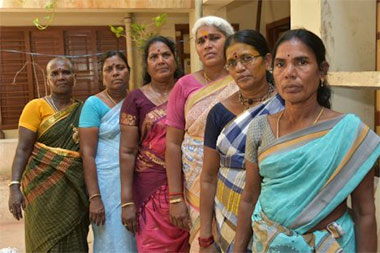 |
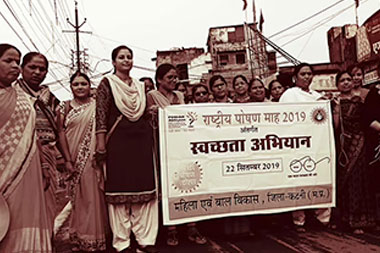 |
|
Ayesha, our Research Associate in the Research Wing writes two articles on ASHA and Anganwadi Workers; one, espousing securing formal rights for these health ‘volunteers’ and second, exploring the banality of budgets and what incremental hikes in healthcare budgets mean for these workers. (Read the articles by clicking on the link given above )
As part of the GRTA–CHIRAG project, PRADAN (Professional Assistance for Development Action) is currently working with ASHAs and AWWs to recognize and build on the instrumental role they play in establishing sustainable food systems. |
|
|
|
|
|
|
Lahanti Club Story Featured Gaon Connection released ‘The State of Rural India Report’ in December as a unique compendium of over 40 ground reports from rural India published by Gaon Connection last year. The report provides insights into the key events of the year in Rural India. Lahanti Club story on Santhali youth of Chakai documenting their traditional knowledge systems on sustainable food with DSLR cameras was featured in this report (Pages 76-78).
|
|
| |
|
|
Arundhita and Atul published an article in Agriculture World (print) magazine (January edition) on Food Sovereignty and how COVID pandemic helped the Santhals in Chakai reconnect with their forests and reiterated Food sovereignty in is about the right of people to determine their own policies relative to food and agriculture–rather than having their food supply subject to market forces.
|
|
|
|
|
|
Reflections on Working and Walking with the youth of Chakai “Every young person, who dropped out from our project, has helped me realize the significance of shifting our perspective as and when needed. Young people need some space as much as they need some intimate mentorship; they seek self-serving pleasures as much as they love socially meaningful roles; they would love some stable source of money as much as they would like to unsettle some social norms.”
Gautam writes a reflective piece on working with the Santhali youth of Chakai Click here to read Gautam’s article
|
|
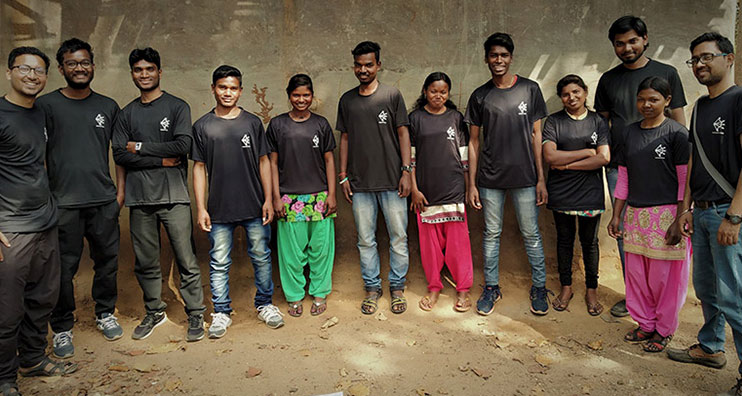 |
|
|
|
|
|
Actigraph: a case study of the processes vis-a-vis perceptions around food intake and energy expenditure |
|
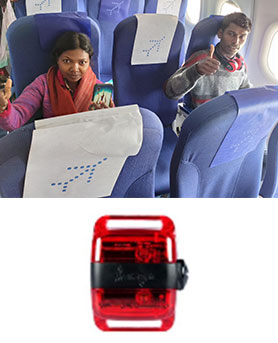 Astha, our Research Associate with the TIGR2ESS project visited ICRISAT with Kusum and Sonalal, Lahanti Club members (who are also our CHIRAG mentors and volunteers in CHIRAG-GRTA project now) to study the use of accelerometer devices. The concept of using accelerometers (and Actigraph in this case) in our research project emerged from an interest in understanding the direct relationship between food intake and energy expenditure among communities in our location, Chakai. Astha, our Research Associate with the TIGR2ESS project visited ICRISAT with Kusum and Sonalal, Lahanti Club members (who are also our CHIRAG mentors and volunteers in CHIRAG-GRTA project now) to study the use of accelerometer devices. The concept of using accelerometers (and Actigraph in this case) in our research project emerged from an interest in understanding the direct relationship between food intake and energy expenditure among communities in our location, Chakai.
Click here to read Astha's blog where she shares her learnings from the visit and how she applies that in Chakai with the team.
|
|
|
|
WEBINAR |
|
Presenting CHIRAG project at UEA-UNESCO Chair Webinar |
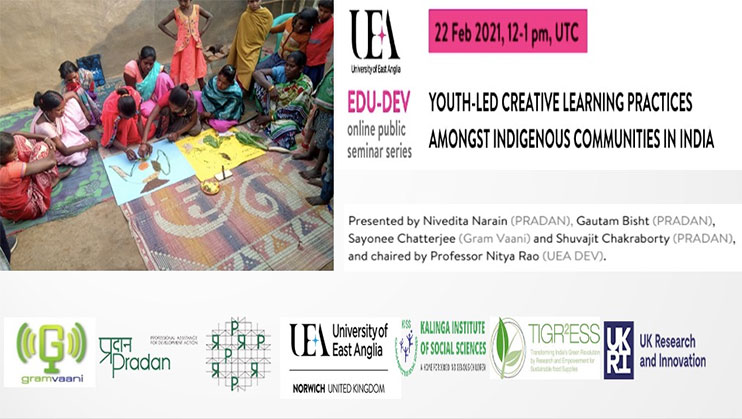 |
|
|
The talk presented by Nivedita, Gautam and Shuvajit provide insights from CHIRAG - a project on sustainable food systems amongst Santhal communities in India. Focusing on experiences from the Santhal Parganas region of Bihar and Jharkhand, the panel reflects on two key elements of the community-based creative learning and participatory design approaches it has adopted, namely, participatory film-making and virtual platforms. The presenters discussed how youth from the community have ‘taken hold’ of these technologies and adapted them to meet their needs, in this case, running educational programmes for younger children in the context of covid-19-induced school closures, or supporting stranded migrant workers, moving beyond food and nutrition literacy. The talk was attended by around 130 participants in the stimulating webinar where important questions were raised and insights received on creative learning practices
|
|
|
|
Presenting findings and experiences from CHIRAG in PRADAN Nutrition IRG |
|
|
On February 20, we presented our CHIRAG project in the second Nutrition IRG webinar. Our presentation titled “Sustainable food systems and community-led creative approaches to address food and nutrition security” delved into the concept and framework of sustainable food system and outlined PRADAN’s engagement in this theme in Chakai. The talk also presented the methods that we used to build and understand the context that we are working on (Santhal Parganas and Chakai) and how we applied our findings to design interventions. CHIRAGVaani, the Interactive voice Response System (IVRS) and creative practices on field are the two ways in which we are working with the Santhal community in these regions to address food and nutrition insecurity.
|
|
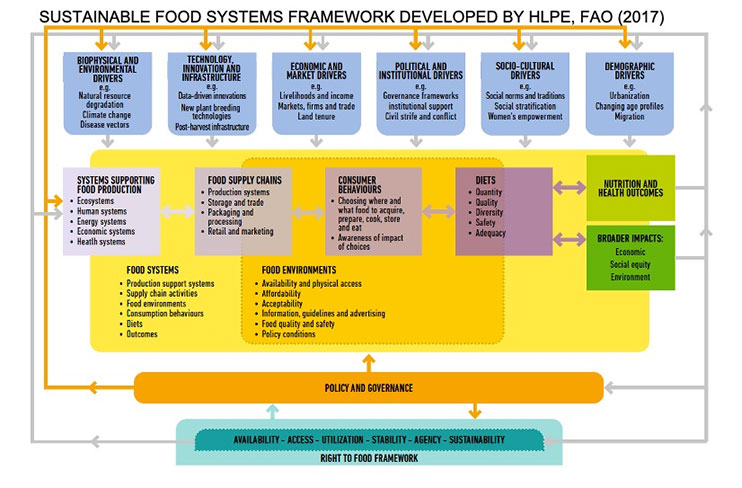 |
|
Project updates
IKEA-PRIDE (Regenerative Agriculture): As part of the baseline study
for monitoring the impact of regenerative agriculture interventions,
the third round of soil sample collection was completed in 7
intervention sites across Jharkhand by Anju Bhaskaran and Siddharth
Panda. Samples were also collected from 5 matching villages where
such interventions are not being carried out. A survey of the sample
farmers was also carried out to capture farming practices as well as
agricultural calendars of the area.
GROW: Pre and post
evaluations and summary reports for all trainings so far have been
completed. Change story summary analyses and remaining data
collection currently in process
Plans ahead: Creating Operations
manual, Training manuals for each training conducted and change
story data analyses; scoping study 2 - design and implementation ;
FGDs with CLF SAC members; Pre and post for remaining gender
trainings planned for SMMU staff plus Gender point person (GPP)
training/,mentoring process to be documented.
Sustainability
of SHGs (3ie): Our report titled ‘Understanding India’s Self Help
Groups: An Organisational anatomy of functionality of SHGs in a
district in Madhya Pradesh has been submitted to 3ie after
incorporating feedback. Our paper with the same title (co-authored
by Michael Walton, Imago and Surili Sheth, UC Berkeley and Nivedita
and Arundhita in PRADAN) has been accepted for a panel discussion
for the Gender and Politics in South Asia workshop at the inaugural
Politics Workshop of Center on Contemporary India at University of
California, Berkeley
TIGR2ESS: Data collection is coming to a
close, with the survey completed and land panel discusions
underway. A paper titled “Building equity and inclusivity through
the shaping of collective spaces: The case of Farmer -Producer
Orgnisations in India” has been submitted to a journal and we await
comments. The paper is co-authored by Tomas Harrington and Nitya Rao
from UEA, Rengalakshmi from MSSRF, Reetu Sogani from Lok Chetna
Manch and Nivedita, Shuvajit and Astha from PRADAN.
GRTA-CHIRAG: Our first ‘campaign’ on CHIRAGVaani (IVRS), the Winter
Campaign, is currently running. Using audio dramas and interviews,
the campaign focusses on knowledge and perspectives around dietary
diversity and its link with food cultures and practices, health and
nutrition. CHIRAGVaani also allows listeners to record their own
views on the issues discussed. These programmes draw on findings
from the Dietary Diversity Study conducted between December 2020 to
February 2021 among households in Chakai. Data was collected by
community CHIRAG mentors and the team is now analysing the data.
We have received a new QR (Quality Related) GCRF grant from the
UEA and UK government, to focus on research during the times of
COVID, to support the work with the CHIRAG project.
EMERGE:
The manuscript titled “Measuring Women’s Political Empowerment” is
under preparation. The manuscript is co-authored by Soledad
Prillaman and Natalya Rahman from Stanford University and Nivedita
from PRADAN.
DEVELOPMENT-LED INQUIRY: A paper titled
“Inquiring Systems and Development Led Inquiry: Uniting the Efforts
of Farmers, Development Professionals and Researchers” was accepted
in a special issue on Research Methods for the Third Sector and is
undergoing review. This paper describes the approach that was
developed during the ACIAR research projects from 2006-2012;
extended to the ACIAR-CSU Pulses project in Pakistan. The paper is
co-authored by Gavin Ramsay from Charles Sturt University, and
Nivedita and Arundhita from PRADAN. In addition, a proposal to ACIAR
around Food Waste in Goat Value Chains: A Study of India and Zambia”
is in the final stages of approval, and uses Development-led inquiry
as an approach to research.
|
|
|
|
From our Partners |
|
Here are the links to Newsletters from our collaborators in two projects: TIGR2ESS Newsletter and
GRTA Newsletter
In the limelight:
New Study done by our collaborators at ICRISAT fills critical gap in
understanding pandemic impact on food value chains and offers
solutions. Read the key findings of the paper
here
Does improving food market access improve rural household
nutritional outcome in developing countries?
Diversification of farms is often advocated for bringing diet
diversity to rural households and improving nutrition, but how does
it compare to market access? This blog written by our collaborators
at ICRISAT traverses an extensive review of literature on the
subject that was recently published. The review sought to determine
the association between market access and dietary diversity in
developing countries. Verdict: the answer lies in context and
detail..
Shreya Sinha, our collaborator at the University of Cambridge writes
an insightful piece on the recent farmer protests, titled India
protests: Farmers could switch to more climate-resilient crops- but
they have been given no incentive. Read the article
here
Shreya’s commentaries on the ongoing farmer’s movement in India have
featured on the NDTV, BBC, the India Forum and a number of other
media outlets.
|
|
|
|
|
Copyright © 2021 PRADAN
. All Rights Reserved. |
|
|
